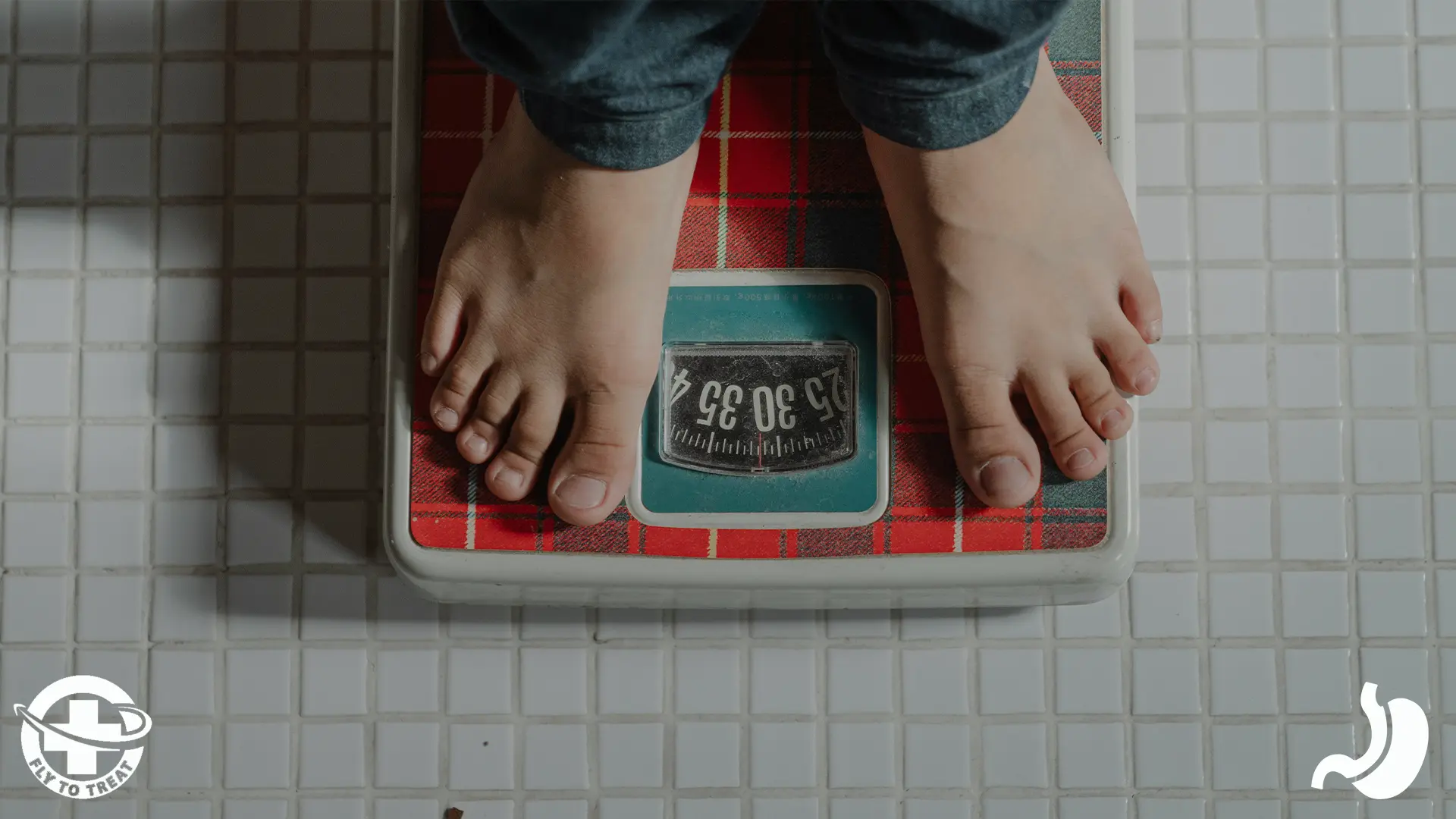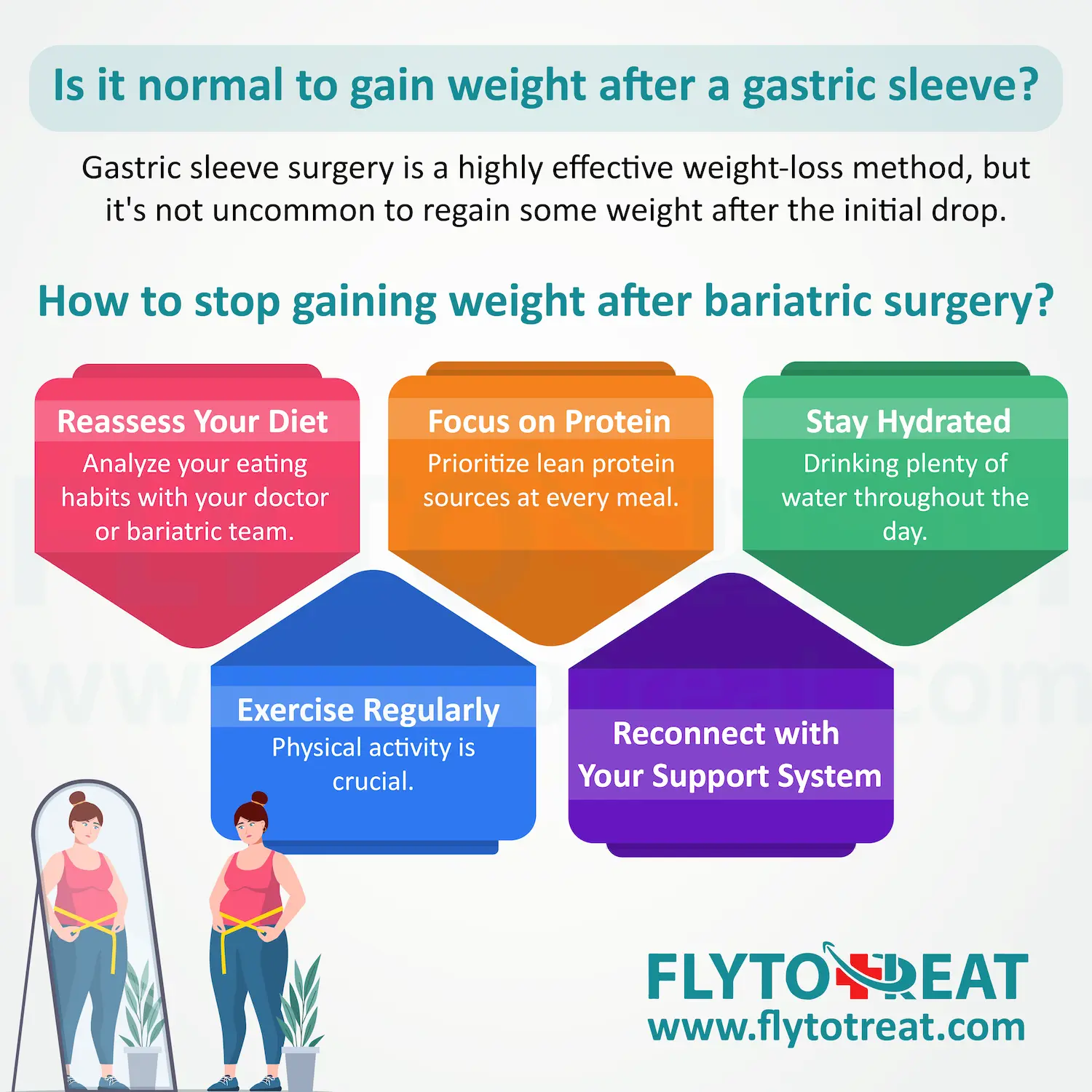
How to stop gaining weight after sleeve surgery?
Weight gain after sleeve surgery is a concern for many who have undergone this procedure. FlyToTreat acknowledges the complexities of managing weight after such a significant transformation and aims to provide practical advice to prevent and address weight regain. This article will explore common causes of weight gain post-surgery and offer strategies to maintain weight loss long-term. Questions like "What percentage of gastric sleeve patients regain weight?" and "Why am I gaining weight after gastric sleeve?" will be addressed to ensure you are well equipped to manage your health effectively.
Why did I gain weight after sleeve surgery?
Weight loss after sleeve gastrectomy is typically significant, but weight regain can sometimes occur. Here are some reasons why you might regain weight after gastric sleeve:
• Dietary Changes: Slipping back into old eating habits, including sugary drinks or excessive snacking, can negate the surgery's effects.
• Portion Control: While the sleeve restricts volume, mastering portion control is still crucial to prevent weight regain, forbbiden food after gastric sleeve
• Nutrient Deficiencies: Reduced nutrient absorption can lead to increased hunger and cravings, making weight management more challenging.
Regain is possible, but it doesn't have to be permanent. Consult your doctor or bariatric team to assess your situation and develop a plan to get back on track with your weight loss goals.

What percentage of gastric sleeve patients regain weight?
There is not a single certain number about putting on weight after gastric sleeve. Depending on how many years have passed since the surgery, different studies suggest different statistics. Here we explore some of these studies:
• According to a study by Sabrena F. Noria and her colleagues, Up to 76% of patients experience gaining weight 2 years after gastric sleeve significantly, with regain being most common two years after reaching the lowest weight.
• A study by Jan Kapała and his colleagues has shown weight regain ranging from 5.7% at two years to 75.6% at six years.
• Another study suggests that 20 to 24% of patients are subject to gaining weight 5 years after gastric sleeve by more than 15% of their body weight.
It's important to note that these are just some examples, and weight regain statistics can vary depending on the study. Generally, putting on weight after gastric sleeve is up to you and depends on your lifestyle modifications. Let us see what modifications prevent weight gain after sleeve surgery.
How to prevent gain weight after gastric sleeve surgery?
Gastric sleeve surgery is a powerful tool for weight loss, but long-term success requires a commitment to healthy habits and healthy lifestyle after sleeve surgery. Here are some key strategies to prevent weight gain after sleeve gastrectomy:
• Prioritize Protein: Focus on lean protein sources like chicken, fish, and beans at every meal. Protein keeps you feeling fuller for longer, reducing calorie intake and aiding weight management.
• Mindful Eating: Eat slowly, savor your food, and stop eating when you feel comfortably full, not stuffed. This helps maintain healthy portion control even with a smaller stomach.
• Stay Hydrated: Drinking plenty of water throughout the day helps curb cravings, promotes a feeling of fullness, and aids digestion. Aim for eight glasses of water daily.
• Dietary Balance: gastric sleeve meal plan menu Include plenty of fruits, vegetables, and whole grains in your diet for essential vitamins, minerals, and fiber to support overall health and metabolism.
• Exercise Regularly: Regular physical activity is crucial for maintaining weight loss and overall well-being. Aim for at least 150 minutes of moderate-intensity exercise per week.
Following these tips and attending regular follow-up appointments with your bariatric team is essential for long-term success after sleeve gastrectomy. To expand your knowledge, you can check this article:
Sleeve gastrectomy diet
Here is a brief explanation of necessary information about the sleeve gastrectomy diet. You can dig deeper in this article about diet after sleeve gastrectomy
• Initial Dietary Stages: Start with a clear liquid diet immediately post-surgery to ensure hydration without straining your newly adjusted stomach.
• Long-Term Dietary Adjustments: Eat small, frequent meals and focus on high-protein foods like lean meats, fish, and eggs for tissue repair and muscle maintenance.
• Vital Nutrient Intake: Lifelong vitamin and mineral supplementation is necessary due to changes in digestion and absorption, including multivitamins, calcium, vitamin D, iron, and vitamin B12.
• Prevention of weight gain after gastric sleeve surgery: Maintain a balanced diet and adhere to your nutritional plan to manage weight effectively. Regular follow-ups with a dietitian are crucial to adjust your diet as needed and prevent post gastric sleeve weight gain.
• Hydration and Meal Sizes: Stay hydrated by drinking 64 ounces of fluids daily. Avoid drinking 30 minutes before and after meals. Monitor portion sizes strictly, starting with ¼ cup and gradually increasing to 1 cup.
This structured approach ensures that you meet your nutritional needs while preventing common post-surgical complications like gaining weight after bariatric surgery.
Is it normal to gain weight after a gastric sleeve?
Gastric sleeve surgery is a highly effective weight-loss method, but it's not uncommon to regain some weight after the initial drop. There are several reasons for this, such as returning to old eating habits like sugary drinks or excessive portion sizes, even with a reduced stomach. Nutrient deficiencies resulting from reduced nutrient absorption can lead to increased hunger and cravings, which makes it harder to maintain healthy eating habits. It's important to understand that sleeve surgery is a tool that requires ongoing commitment to healthy diet, exercise, and lifestyle changes to achieve long-term success. If you experience any weight regain, don't consider it a failure. Instead, consult your doctor to identify potential causes and create a plan to get back on track with your weight loss goals.

How to stop gaining weight after bariatric surgery?
While it is common to experience weight regain after bariatric surgery, it is important to keep in mind that it is not irreversible. To help prevent weight gain after the surgery, there are several steps you can take. These may include following a healthy and balanced diet, engaging in regular physical activity, attending support groups, and consulting with your healthcare provider. By being proactive and taking these steps, you can maintain a healthy weight and continue to enjoy the benefits of bariatric surgery.:
• Reassess Your Diet: Analyze your eating habits with your doctor or bariatric team. Identify areas for improvement, like portion control, sugary drink intake, or unhealthy snacking.
• Focus on Protein: Prioritize lean protein sources at every meal. Protein keeps you feeling fuller for longer, reducing calorie intake and aiding weight management.
• Stay Hydrated: Drinking plenty of water throughout the day curbs cravings promotes fullness, and aids digestion. Aim for eight glasses of water daily.
• Exercise Regularly: Physical activity is crucial. Aim for at least 150 minutes of moderate-intensity exercise per week to boost metabolism and burn calories.
• Reconnect with Your Support System: Seek support from your doctor, bariatric team, or a weight loss support group. They can offer guidance, motivation, and accountability.
Early intervention is key. By addressing weight regain promptly and recommitting to healthy habits, you can get back on track with your weight loss goals.
Conclusion
In conclusion, managing weight gain after VSG is crucial for sustaining the benefits of gastric sleeve surgery. FlyToTreat is dedicated to supporting patients in navigating the challenges of post-surgery weight management by providing essential knowledge and practical strategies. By understanding the factors that contribute to weight regain and implementing the recommended dietary and lifestyle modifications, patients can enhance their chances of long-term success and minimize the likelihood of regaining weight after gastric sleeve surgery. This comprehensive approach ensures that patients not only achieve their weight loss goals but also maintain their health and wellness in the years following the surgery.
MEDICALLY REVIEWED BY: Dr. Ali Bazazi
AUTHOR: FlytoTreat's team of Authors
15 April 2024 - Updated At: 29 September 2024
Related Articles
Comment






